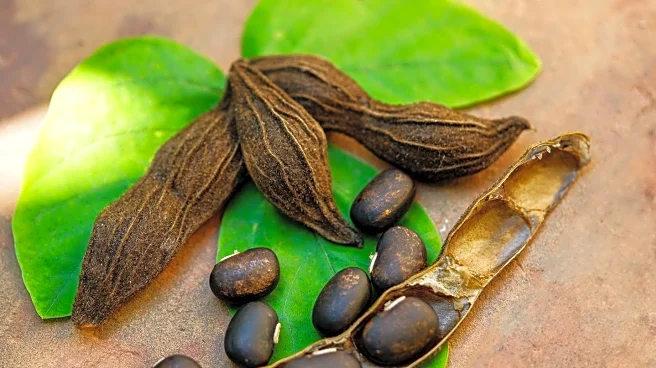What is the story about?
What's Happening?
A recent study has assessed the effectiveness of 20 herbal products commonly used in Ghana for treating malaria, focusing on their ability to combat Plasmodium falciparum, the parasite responsible for the disease. The research identified 38 different medicinal plant products within these formulations, highlighting the rich biodiversity of Ghanaian medicinal plants. Among the products, MSM, formulated from Cryptolepis sanguinolenta, demonstrated potent antimalarial activity due to its indoloquinoline alkaloids. Other frequently used plants include Azadirachta indica and Alstonia boonei, known for their antimalarial properties. The study found that six products showed good activity, with MSM and TTM being the most effective. The research also explored the response of P. falciparum parasites to these herbal products, noting that MSM exhibited significant anti-plasmodial activity, reducing parasitemia levels sharply.
Why It's Important?
The study's findings are significant as they provide scientific backing for the use of certain herbal remedies in malaria treatment, potentially influencing healthcare practices in regions where malaria is prevalent. The identification of effective herbal products could offer alternative treatment options, especially in areas with limited access to conventional medicines. However, the study also raises concerns about the potential for resistance development due to structural similarities between some herbal compounds and conventional antimalarial drugs like chloroquine. This could impact the long-term efficacy of these herbal treatments and necessitate careful monitoring and regulation.
What's Next?
Further research is needed to validate the efficacy of these herbal products and explore their potential integration into mainstream healthcare. The study suggests that additional assays are required to confirm the activity of certain products and understand their mechanisms of action. There may also be a need for regulatory frameworks to ensure the safe and effective use of herbal medicines, preventing the emergence of drug-resistant malaria strains. Stakeholders, including healthcare providers and policymakers, may need to consider these findings in developing strategies for malaria treatment and prevention.
Beyond the Headlines
The study highlights the broader implications of using herbal medicines, including ethical considerations around traditional knowledge and biodiversity conservation. The integration of herbal remedies into healthcare systems could promote cultural heritage and support local economies. However, it also underscores the need for scientific validation and regulation to ensure safety and efficacy, preventing potential misuse or over-reliance on unproven treatments.














